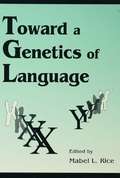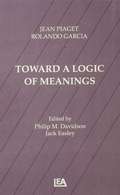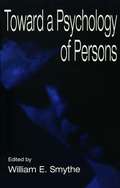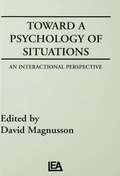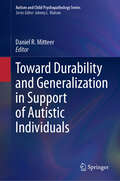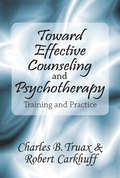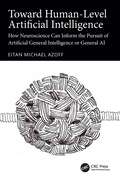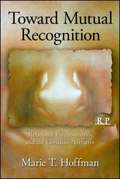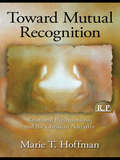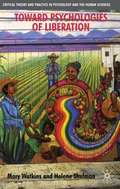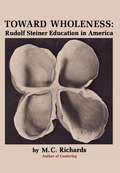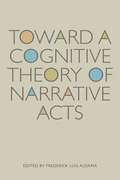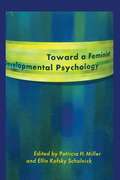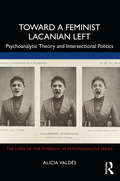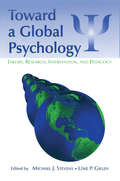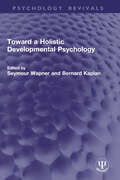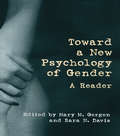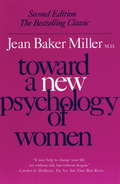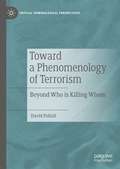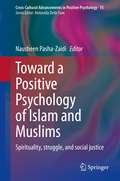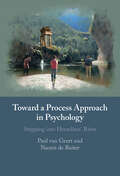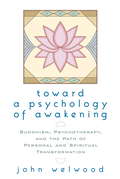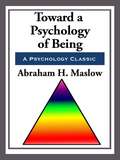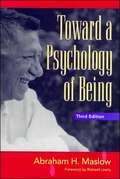- Table View
- List View
Toward A Genetics of Language
by Mabel L. RiceThe past decade has brought important new advances in the fields of genetics, behavioral genetics, linguistics, language acquisition, studies of language impairment, and brain imaging. Although these advances are each highly relevant to the determination of what a child is innately prepared to bring to language acquisition, the contributing fields of endeavor have traditionally been relatively self-contained, with little cross communication. This volume was developed with the belief that there is considerable value to be gained in the creation of a shared platform for a dialogue across the disciplines.Leading experts in genetics, linguistics, language acquisition, language impairment, and brain imaging are brought together for the purpose of exploring the current evidence, theoretical issues, and research challenges in a way that bridges disciplinary boundaries and points toward future developments in the search for the genetic and environmental bases of language acquisition and impairments. This collection provides discussions and summaries of: *breakthrough findings of the genetic underpinnings of dyslexia; *theoretical and empirical developments in the specification of a phenotype of language acquisition and impairment; *evidence of familiarity and twin concordances of specific language impairment; and*new evidence from brain imaging.It concludes with a critical response from an advocate of rational empiricism.
Toward A Logic of Meanings
by Jean Piaget Philip Davidson Rolando GarciaThis book, the last one written by Piaget, presents a new line of empirical studies based on a revised formulation of his theory of the development of logical reasoning. The amended theory overcomes many problems and criticisms of his earlier formulations by providing a fresh explanation for the origin of mental operations and mental organization based on the concept of meaning. It also offers a more elegant vision of the continuity in mental development from birth to adulthood. As the final revision of Piaget's theory -- and one that opens up new areas of inquiry -- this book calls for a reinterpretation of his earlier work -- a task which will occupy scholars for decades to come.
Toward A Psychology of Persons
by William E. SmytheThis closely integrated collection of essays constitutes a wide-ranging and comprehensive attempt to understand persons within psychology--a long-lost enterprise. The volume was inspired by the observation that contemporary psychology has become increasingly depersonalized in its conceptions and its methodology, and has thereby lost touch with its traditional subject matter of human individuality and the nature of persons. This development now threatens the integrity of psychology as a discipline. Using both a critical and constructive approach, the various contributors share two common objectives: *to explore the roots of depersonalization in modern psychology through systematic criticism of contemporary functionalist and neo-functionalist approaches; *to articulate some alternative holistic-interpretive and historical approaches to the psychology of persons. Despite these common objectives, the chapters reflect a wide variety of theoretical perspectives and approaches, including cognitive science and neuroscience, discursive psychology, hermeneutics, social constructionism, semiotics, rhetorical analysis, and psychological aesthetics. These essays do not converge on a unified psychology of persons, but they do serve to reopen a form of discourse that has long been absent from mainstream psychology. This volume emerged from the deliberations of the Western Canadian Theoretical Psychologists (WCTP)--a group of scholars primarily from Western Canadian universities with shared interests in the history and theory of psychology. From its founding in 1989 to the present, the WCTP has been actively engaged in promoting and contributing to the development of theoretical psychology. Over the past half dozen years, scholars have greatly benefitted from the close collaboration and collegial support that participation in the WCTP makes possible. The annual meetings provide an opportunity for them to catch up on each other's work and also to pool their expertise to work on topics of shared interest.
Toward A Psychology of Situations: An Interactional Perspective
by David MagnussonPublished in the year 1981, Toward a Psychology of Situations is a valuable contribution to the field of Social Psychology.
Toward Durability and Generalization in Support of Autistic Individuals (Autism and Child Psychopathology Series)
by Daniel R. MitteerThis book describes methods for improving the maintenance and generalization of behavior analytic treatment outcomes for individuals with autism. It introduces the concept of durability—not just treatments that maintain across days or weeks, or that generalize to a few new settings, but those that remain successful under increasingly challenging situations (e.g., over years, during changing reinforcement conditions, across service providers). Chapters address key topics, such as preventive care, early behavioral intervention, treatment of severe destructive behavior, teaching skills across the lifespan, and medication management. In addition, the book addresses ethical and cultural considerations as they relate to treatment maintenance and concludes with perspectives from autistic voices and caregivers. Chapters include case examples highlighting durable outcomes as well as schematics and materials (e.g., data sheets) to assess and maintain treatment gains. Key areas of coverage include: Behavioral persistence, durability of treatment effects, and relapse across the following domains. Early learner and academic skills. Toileting and self-care skills, feeding behavior, and verbal behavior. Social skills and socially reinforced destructive behavior. Automatically reinforced destructive behavior. Medical compliance, implementer behavior, and geriatric behavior.
Toward Effective Counseling and Psychotherapy: Training and Practice
by Robert CarkhuffThe field of counseling and psychotherapy has for years presented the puzzling spectacle of unabating enthusiasm for forms of treatment whose effectiveness cannot be objectively demonstrated. With few exceptions, statistical studies have consistently failed to show that any form of psychotherapy is followed by significantly more improvement than would be caused by the mere passage of an equivalent period of time. Despite this, practitioners of various psychotherapeutic schools have remained firmly convinced that their methods are effective. Many recipients of these forms of treatment also believe that they are being helped.The series of investigations reported in this impressive book resolve this paradoxical state of affairs. The investigators have overcome two major obstacles to progress in the past--lack of agreement on measures of improvement and difficulty of measuring active ingredients of the psychotherapy relationship. The inability of therapists of different theoretical persuasions to agree on criteria of improvement has made comparison of the results of different forms of treatment nearly impossible. The authors have solved this intractable problem by using a wide range of improvement measures and showing that, regardless of measures used in different studies, a significantly higher proportion of results favor their hypothesis than disregard it.Overall, this book represented a major advance at the time of its original publication and is of continuing importance. The research findings resolve some of the most stubborn research problems in psychotherapy, and the training program based on them points the way toward overcoming the shortage of psychotherapists.
Toward Human-Level Artificial Intelligence: How Neuroscience Can Inform the Pursuit of Artificial General Intelligence or General AI
by Eitan Michael AzoffIs a computer simulation of a brain sufficient to make it intelligent? Do you need consciousness to have intelligence? Do you need to be alive to have consciousness? This book has a dual purpose. First, it provides a multi-disciplinary research survey across all branches of neuroscience and AI research that relate to this book’s mission of bringing AI research closer to building a human-level AI (HLAI) system. It provides an encapsulation of key ideas and concepts, and provides all the references for the reader to delve deeper; much of the survey coverage is of recent pioneering research. Second, the final part of this book brings together key concepts from the survey and makes suggestions for building HLAI. This book provides accessible explanations of numerous key concepts from neuroscience and artificial intelligence research, including: The focus on visual processing and thinking and the possible role of brain lateralization toward visual thinking and intelligence. Diffuse decision making by ensembles of neurons. The inside-out model to give HLAI an inner "life" and the possible role for cognitive architecture implementing the scientific method through the plan-do-check-act cycle within that model (learning to learn). A neuromodulation feature such as a machine equivalent of dopamine that reinforces learning. The embodied HLAI machine, a neurorobot, that interacts with the physical world as it learns. This book concludes by explaining the hypothesis that computer simulation is sufficient to take AI research further toward HLAI and that the scientific method is our means to enable that progress. This book will be of great interest to a broad audience, particularly neuroscientists and AI researchers, investors in AI projects, and lay readers looking for an accessible introduction to the intersection of neuroscience and artificial intelligence.
Toward Mutual Recognition: Relational Psychoanalysis and the Christian Narrative
by Marie T. HoffmanComing from a Christian perspective, she suggests that the current relational turn in psychoanalysis has been influenced by numerous theorists - analysts and philosophers alike - who were themselves shaped by an embedded Christian narrative.
Toward Mutual Recognition: Relational Psychoanalysis and the Christian Narrative (Relational Perspectives Book Series)
by Marie T. HoffmanEver since its nascent days, psychoanalysis has enjoyed an uneasy coexistence with religion. However, in recent decades, many analysts have been more interested in the healing potential of both psychoanalytic and religious experience and have explored how their respective narrative underpinnings may be remarkably similar. In Toward Mutual Recognition, Marie T. Hoffman takes just such an approach. Coming from a Christian perspective, she suggests that the current relational turn in psychoanalysis has been influenced by numerous theorists - analysts and philosophers alike - who were themselves shaped by an embedded Christian narrative. As a result, the redemptive concepts of incarnation, crucifixion, and resurrection - central to the tenets of Christianity - can be traced to relational theories, emerging analogously in the transformative process of mutual recognition in the concepts of identification, surrender, and gratitude, a trilogy which she develops as forming the "path of recognition." Each movement on this path of recognition is given thought-provoking, in-depth attention. Chapters dedicated to theoretical perspectives utilize the thinking of Benjamin, Hegel, and Ricoeur. In her historical perspectives, she explores the personal and professional histories of analysts such as Sullivan, Fairbairn, Winnicott, Erikson, Kohut, and Ferenczi, among others, who were influenced by the Christian narrative. Uniting it all together is the clinical perspective offered in the compelling extended case history of Mandy, a young lady whose treatment embodies and exemplifies each of the steps along the path of growth in both the psychoanalytic and Christian senses. Throughout, a relational sensibility is deployed as a cooperative counterpart to the Christian narrative, working both as a consilient dialogue and a vehicle for further integrative exploration. As a result, the specter of psychoanalysis and religion as mutually exclusive gives way to the hope and redemption offered by their mutual recognition.
Toward Psychologies Of Liberation
by Helene Shulman Mary WatkinsUnderstanding that the psychological well-being of individuals is inextricably linked to the health of their communities, environments, and cultures, the authors propose a radical interdisciplinary reorientation of psychology to create participatory and dialogical spaces for critical understanding and creative restoration.
Toward Wholeness: Rudolf Steiner Education in America
by Mary Caroline RichardsFor Rudolf Steiner, life can be truly understood only if it is experienced as art is experienced, as inner activities expressed through physical materials. On this ground of the union of inner experience and sensory life, he developed his unique, holistic approach to education. Richards views Steiner schools as expressing a new educational consciousness appropriate for our time, a "grammar of interconnections" among scientific observational, artistic imagination, religious reverence, and practical activity in which every part bears a deep connection.
Toward a Cognitive Theory of Narrative Acts
by Frederick Luis AldamaToward a Cognitive Theory of Narrative Acts brings together in one volume cutting-edge research that turns to recent findings in cognitive and neurobiological sciences, psychology, linguistics, philosophy, and evolutionary biology, among other disciplines, to explore and understand more deeply various cultural phenomena, including art, music, literature, and film. The essays fulfilling this task for the general reader as well as the specialist are written by renowned authors H. Porter Abbott, Patrick Colm Hogan, Suzanne Keen, Herbert Lindenberger, Lisa Zunshine, Katja Mellman, Lalita Pandit Hogan, Klarina Priborkin, Javier Gutiérrez-Rexach, Ellen Spolsky, and Richard Walsh. Among the works analyzed are plays by Samuel Beckett, novels by Maxine Hong Kingston, music compositions by Igor Stravinsky, art by Jean-Baptiste-Simeon Chardin, and films by Michael Haneke. Each of the essays shows in a systematic, clear, and precise way how music, art, literature, and film work in and of themselves and also how they are interconnected. Finally, while each of the essays is unique in style and methodological approach, together they show the way toward a unified knowledge of artistic creativity.
Toward a Feminist Developmental Psychology
by Patricia H. Miller Ellin Kofsky ScholnickThis collection of original essays integrates the exciting recent scholarship on feminist theories and methods into developmental psychology. It also acquaints women's studies scholars with issues in developmental psychology that raise interesting questions for feminist theories. Its focus goes beyond that of traditional scholarship that tends to focus only on sex differences and sex roles; instead it considers alternative views of what is worth studying, how one should study it, etc. The chapters provide new, feminist perspectives on topics of great current interest to developmental psychologists.
Toward a Feminist Lacanian Left: Psychoanalytic Theory and Intersectional Politics
by Alicia ValdésWhile traditional feminist readings on antagonism have pivoted around the sole axis of sex and/or gender, a broader and intersectional approach to antagonism is much needed; this book offers an innovative, feminist, and discursive reading on the Lacanian concept of sexual position as a way to problematize the concepts of political antagonism and political subjects. Can Lacanian psychoanalysis offer new grounds for feminist politics? This discursive mediation of Lacan's work presents a new theoretical framework upon which to articulate proposals for intersectional political theory. The first part of this book develops the theoretical framework, and the second part applies it to the construction of woman’s identity in European politics and economy. It concludes with notes for a feminist political and economic praxis through community currencies and municipalism. The interdisciplinary approach of this book will appeal to scholars interested in the fields of psychoanalysis, feminisms, and political philosophy as well as multidisciplinary scholars interested in discourse theory, sexuality and gender studies, cultural studies, queer theory, and continental philosophy. Students at master's and PhD level will also find this a useful feminist introduction to Lacanian psychoanalysis, discourse, and gender.
Toward a Global Psychology: Theory, Research, Intervention, and Pedagogy (Global And Cross-cultural Psychology Ser.)
by Uwe P. Gielen Michael J. StevensToward a Global Psychology defines the emerging field of international psychology. It provides an overview of the conceptual models, research methodologies, interventions, and pedagogical approaches that are most appropriate to transnational settings. In so doing, the book provides readers with a rich appreciation of how to approach a global psycho
Toward a Global Psychology: Theory, Research, Intervention, and Pedagogy (Global and Cross-Cultural Psychology Series)
by Michael J. Stevens and Uwe P. GielenToward a Global Psychology defines the emerging field of international psychology. It provides an overview of the conceptual models, research methodologies, interventions, and pedagogical approaches that are most appropriate to transnational settings.
Toward a Holistic Developmental Psychology (Psychology Revivals)
by Bernard Kaplan Seymour WapnerOriginally published in 1983, the main aim of this volume was to suggest new ways of conceptualizing human development and new domains of theorizing and engaging in practice for those who were vitally concerned with the nature and value of human beings. Toward this goal, colleagues and students of the later Heinz Werner, believing that Werner provided the schema for such a vision, here present modifications, extensions, and elaborations of his insights concerning the nature of development. The Wernerian approach, in origin and aim, is concerned with the development of the whole human being. The papers here were intended only as a stimulus to provoke others as well as the contributors themselves to a new, yet old approach, to human experience, thought, and action. Today it can be read and enjoyed in its historical context.
Toward a New Psychology of Gender: A Reader
by Mary M. Gergen Sara N. DavisDrawn from a brilliant array of voices primarily from psychology, but also from other social sciences and humanities, this unique reader of creative and intellectually provocative essays investigates the social construction of gender. For the past several decades, those involved with the study of the psychology of women and gender have been struggling for recognition within the framework of psychology. This volume brings together the writings from psychology, philosophy, psychoanalysis, history, women's studies, education and sociology that critique mainstream thinking and exemplify new ways of creating inquiry.
Toward a New Psychology of Women
by Jean Baker MillerIn the twenty years since its publication, this best-selling classic (which has sold more than 200,000 copies) has become famous for its groundbreaking demonstration of how sexual stereotypes restrict men's and women's psychological development. Toward a New Psychology of Women revolutionized concepts of strength and weakness, dependency and autonomy, emotion, success, and power.
Toward a Phenomenology of Terrorism: Beyond Who is Killing Whom (Critical Criminological Perspectives)
by David PolizziThis book examines the socio-psychological dynamics and drivers of terrorism from a humanistic perspective. Most interpret terrorism as meaningless, asocial violence but this book argues that it's not just a case of seeing 'who is killing whom' but that defining and understanding terrorism is configured by historical context and immediate experience. The author argues that these acts of terrorist violence can be interpreted as the external expression of repressed feelings and impulses that have been tabooized by mainstream society. Upon release, these terrorists gain a new 'nomos' which generates a sense of meaning and significance for them. This book draws on psycho-analytical theories of repression, Heideggerian existentialism, Berger’s anthropological concept of culture as ‘nomos’, and Roger Griffin’s analysis of terrorist fanaticism, adding to the understanding terrorism and criminality from a new perspective and beyond the usual literature situated in political science, security/war and peace studies. This book seeks to provide: a definition of terrorism, an account of the psychological theory, an explanation of the nomic dimension of terroristic violence, an exploration of the relevance of the new approach to understanding: Salafi jihadism, Al-Qaeda, Islamic State, the Taliban, White Supremacism, the rise of the Radical Right, and reflections on this for combating terrorism. It appeals to those interested in terrorism, conflict, terrorist radicalization and motivation, international relations, politics and religious politics, and to counter-terrorism agencies.
Toward a Positive Psychology of Islam and Muslims: Spirituality, struggle, and social justice (Cross-Cultural Advancements in Positive Psychology #15)
by Nausheen Pasha-ZaidiThis book integrates research in positive psychology, Islamic psychology, and Muslim wellbeing in one volume, providing a view into the international experiential and spiritual lives of a religious group that represents over 24% of the world’s population. It incorporates Western psychological paradigms, such as the theories of Jung, Freud, Maslow, and Seligman with Islamic ways of knowing, while highlighting the struggles and successes of minoritized Muslim groups, including the LGBTQ community, Muslims with autism, Afghan Shiite refugees, and the Uyghur community in China.It fills a unique position at the crossroad of multiple social science disciplines, including the psychology of religion, cultural psychology, and positive psychology. By focusing on the ways in which spirituality, struggle, and social justice can lead to purpose, hope, and a meaningful life, the book contributes to scholarship within the second wave of positive psychology (PP 2.0) that aims to illustrate a balance between positive and negative aspects of human experience. While geared towards students, researchers, and academic scholars of psychology, culture, and religious studies, particularly Muslim studies, this book is also useful for general audiences who are interested in learning about the diversity of Islam and Muslims through a research-based social science approach.
Toward a Process Approach in Psychology: Stepping into Heraclitus' River
by Paul van Geert Naomi de RuiterPsychological science constructs much of the knowledge that we consume in our everyday lives. This book is a systematic analysis of this process, and of the nature of the knowledge it produces. The authors show how mainstream scientific activity treats psychological properties as being fundamentally stable, universal, and isolable. They then challenge this status quo by inviting readers to recognize that dynamics, context-specificity, interconnectedness, and uncertainty, are a natural and exciting part of human psychology – these are not things to be avoided and feared, but instead embraced. This requires a shift toward a process-based approach that recognizes the situated, time-dependent, and fundamentally processual nature of psychological phenomena. With complex dynamic systems as a framework, this book sketches out how we might move toward a process-based praxis that is more suitable and effective for understanding human functioning.
Toward a Psychology of Awakening: Buddhism, Psychotherapy, and the Path of Personal and Spiritual Transformation
by John WelwoodHow can we connect the spiritual realizations of Buddhism with the psychological insights of the West? In Toward a Psychology of Awakening John Welwood addresses this question with comprehensiveness and depth. Along the way he shows how meditative awareness can help us develop more dynamic and vital relationships and how psychotherapy can help us embody spiritual realization more fully in everyday life. Welwood's psychology of awakening brings together the three major dimensions of human experience: personal, interpersonal, and suprapersonal, in one overall framework of understanding and practice.
Toward a Psychology of Being
by Abraham H. MaslowFull facsimile of the original edition, not reproduced with Optical Recognition Software. In this compelling book, Professor Maslow uses studies of psychologically healthy people and of the healthiest experiences and moments in the lives of average people to demonstrate that human beings can be loving, noble and creative, that they are capable of pursuing the highest values and aspirations. A classic text in the field of humanistic psychology.
Toward a Psychology of Being
by Abraham MaslowMaslow's classic text on the self-actualizing person.
